Dental Implants in Melrose
Nowak Family Dental provides a range of dental implant treatments in Melrose, MA. Call us today at 781-662-9119 to learn more and schedule an appointment.
Single Tooth Dental Implants
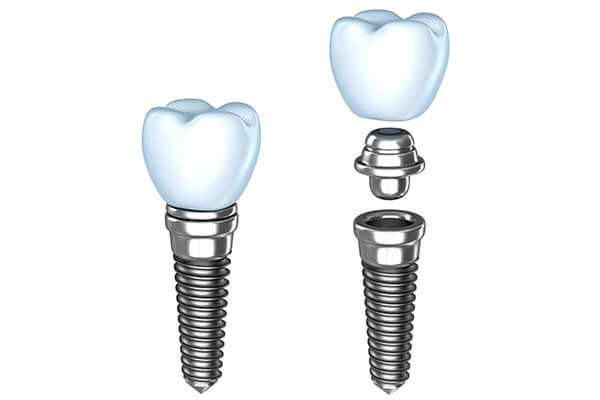
Nowak Family Dental offers single tooth dental implants. Dental implants replace tooth roots in the mouth. Implants provide a strong foundation for fixed or removable replacement teeth and can aid in the prevention of bone loss in the jaw.
Implant Supported Bridges
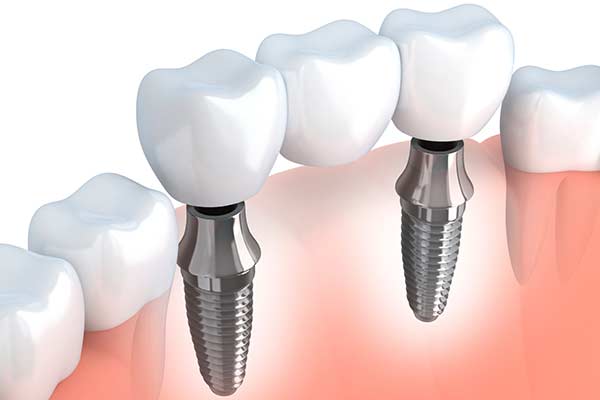
An implant supported bridge is a restorative solution for spaces where three or more adjacent teeth are missing. This restoration typically requires two implants to support the porcelain bridge. The bridge provides a functional and aesthetic replacement for a patient’s natural teeth.
Implant Supported Dentures
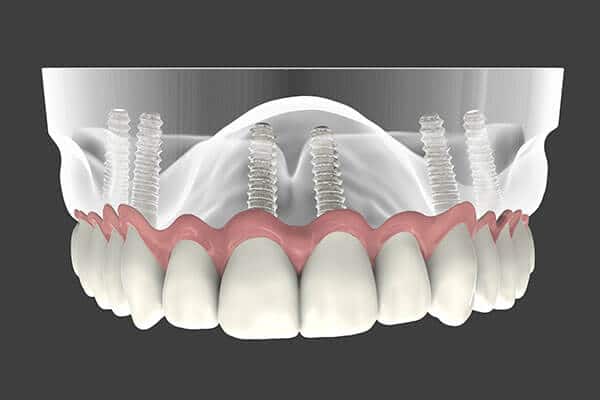
For patients who are missing many or all of their teeth, implant supported dentures may be an alternative to traditional dentures. This solution requires the placement of two or more implants. In order to replace a full arch denture, a minimum of four implants is generally recommended. Eligibility for this solution is dependent upon a number of factors, with jaw bone density being one of the most significant determining factors.
Traditional dentures rely on an acrylic base that sits directly on the gums, held in place by a paste or adhesive. Using implants as supports for dentures allows for a smaller and more comfortable base and less shifting of the prosthesis during use.
Implants can support both full and partial dentures as well as both fixed and removable dentures. If a removable denture is selected, the denture will “snap” on to the implant rather than requiring the use of denture paste or adhesives. Removable dentures can be taken out for cleaning at night.
Full Arch with Only Four Implants
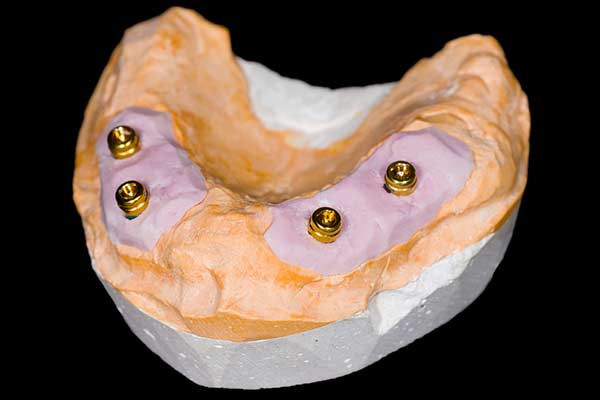
This procedure is a unique implant solution that allows patients with a completely edentulous (toothless) upper or lower arch to replace all of the teeth in that arch using only four implants as anchors.
Mini Dental Implants (MDIs)
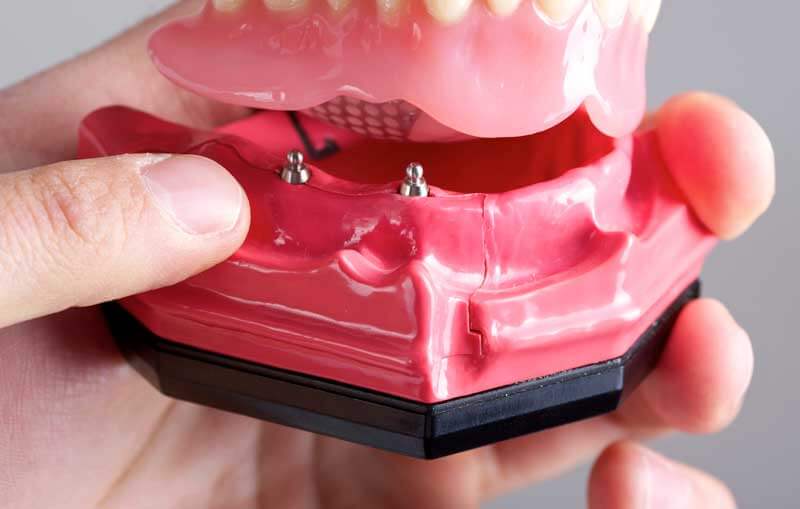
There are times when a full size implant is not a viable option, and in many cases an MDI may be a great solution. Small spaces or inadequate bone mass in the jaw may prevent the use of traditional implants. Mini Dental Implants are similar to regular implants but, as the name suggests, are significantly smaller in diameter. Dental implants typically take 2 visits and require a waiting period of a few months from the time of implant placement to the time the permanent replacement tooth can be placed. The placement of MDIs is minimally invasive, often requiring only local anesthetic and no sutures. For this reason, MDIs can often be placed with the final replacement tooth in one day.
Guided Implant Placement

With this technique, specialized software is used to create custom surgical guides. These guides direct the exact location, angle, and depth of each implant placement. The use of the guide increases the accuracy, efficiency, safety, and predictability of the procedure.
Dental Implants FAQ
What is a dental implant?
Dental implants are small anchors made of a biocompatible metal called titanium that are placed in the jawbone. Dental implants are the replacement of tooth roots in the mouth. Once placed, the anchors begin to fuse with the bone over the course of a few months. After the fusing process, known as osseointegration, abutment posts are inserted into the anchors to allow for the permanent attachment of the replacement teeth.
What are the advantages of an implant supported bridge?
Because of the natural look and feel of the porcelain and the functional stability provided by the implants, implant supported bridges are an effective solution to replace multiple missing teeth.
A traditional bridge uses teeth on either side of the gap where teeth are missing for support. An implant supported bridge uses two or more dental implants rather than the adjacent teeth. When a bridge uses natural teeth for attachment, the natural teeth must be prepped for crowns and are then subject to increased stress which may be damaging - particularly if the existing tooth, roots, or surrounding bone structure are already compromised. A dental implant supported bridge replaced your missing teeth and avoids putting any additional stress on your natural teeth.
Why should I consider implant-supported dentures over traditional dentures?
This technique offers many advantages over traditional dentures.
Easy to care for, this solution can simulate the look and feel of natural teeth and stay fixed in place with the implants acting as anchors. Patients will not experience the typical rocking and movement or gum irritation associated with dentures.
Dental implant placement can also help alleviate the sunken look that can occur with bone loss in the jaw by stimulating bone growth in the area around the implant. This process can also help prevent future bone loss.
How are mini dental implants different from standard dental implants?
In traditional implants, an abutment is attached to the titanium implant screw, and the restoration is then placed on the abutment as shown here.
MDIs are approximately half the diameter of a traditional implant and use a titanium post, rather than a screw. Instead of an abutment piece that supports the final restoration, MDIs use a ball and socket attachment system. The ball on the end of the titanium post (shown above) provides the attachment point for the o-ring in the replacement tooth.
Similarities between MDIs and full size dental implants:
- The implant is inserted into the jawbone.
- The implants, once inserted into the jawbone, are fixed in place.
- The implant serves to replace the tooth root and anchor replacement teeth.
- The placement of the implant can prompt bone regeneration around the placement site.
- The implant can be used to support one or more teeth for crowns or bridges and can also help provide support for removable lower arch dentures.
MDIs may be preferable to full size dental implants in the following situations:
- Bone mass in the jaw is insufficient to support a full size implant screw.
- There is a small space or gap into which to insert the fabricated tooth (such as an incisor as opposed to a molar).
- Children or young adults have congenitally missing teeth.
- Minimally invasive techniques are required due to health or other reasons.
What are the benefits of guided implant placement?
Using CBCT scans, virtual treatment planning, and highly specialized training, we are able to provide guided implant placement for our patients.
Using a virtual 3-D model or a physical model, implant placements and the following restorative work can be simulated to create the ideal patient treatment plan. These virtual plans allow the doctor to take multiple aspects of implant placement and restoration into consideration, resulting in optimal aesthetics, function, and longevity for the patient’s final restoration. Working with a 3-D model also allows the patient to better understand the procedures and visualize the end result.
What is the cost involved to get dental implants in Boston/Melrose?
Dental implants are used to replace missing teeth. “Implants” have several steps involved to re-establish something that fully replaces a tooth. The implant procedures have factors that are dependent on each area and each individual. Implants from surgery to restoration can range from $5000 to $7000 depending on these factors. An evaluation and consultation with a surgeon is the best way to determine what is needed in each specific case to ensure the best outcome.
What can be expected during my dental implant consultation?
An implant consultation involves a clinical evaluation of the treatment area along with x-rays and possible scans for measurements to determine if there is appropriate bone as a foundation for the implant desired. This helps us assess what steps or additional procedures (bone graft, sinus augmentation, regenerative procedures) may be needed and implant sizing is usually also done to idealize the surgical (bone grafting and implant placement) and restorative (abutment, crown, etc.) phases.
How will I know if I am a candidate for dental implants?
A thorough evaluation of your health history, a clinical and radiographic evaluation with possible scans and additional diagnostic tools are used to determine whether or not you are a good candidate for dental implant treatment. A proper consultation with your provider(s) is recommended to help plan out any treatment.
How long will it take me to return to normal activities after getting dental implants?
Although several factors determine the type of surgery, the extent of areas being treated, and each individual’s healing, typically patients are able to return to regular daily activities soon after a dental implant procedure. Be sure to ask specifics for your case during your consultation as many patients have minimal discomfort and have to minimize only vigorous activities for the initial healing period.
How much pain is involved with dental implants surgery?
With proper treatment planning, we are able to keep many procedures more minimally invasive than ever before. Most patients have no pain during the procedure and minimal discomfort for a few days after. Talk to your surgeon about the appropriate post-operative plan for you and follow our recommendations for care during the recovery period for optimal success.
Can I get dental implants in 1 day or the same visit?
Although possible, your clinical situation will determine whether or not you may be a candidate for same-day or 1-day implant placement. We can evaluate and discuss which parameters are especially critical to enable this type of treatment. You and your surgeon can determine the best scenario for you with the ideal outcomes at your consultation.
Are same day implants more expensive?
Usually, the cost of a dental implant is calculated by each procedure that is needed, so same-day implants are usually not more expensive. Whether they are completed all in the same visit or spread over separate visits the cost should be the same, however, discuss with your surgeon if there are any procedures that may influence one treatment option over the other for your specific case.
What will I do with my missing tooth while the implant is healing?
There are several options for temporary tooth replacement while healing during implant procedures. Some are removable and some are temporarily fixed in place. Make sure to discuss these options with your restorative dentist see what is best for you.
What differentiates a dental implant from dentures?
In very general terms (as these treatment options are not always interchangeable), an implant is permanently fixed into your jaw and is not removed and therefore once restored is similar to the space and function of a natural tooth. Most patients can perform all tasks just as they would with a natural tooth and it does not affect speech or taste like a denture can. Dentures are removable tooth replacements that have to be removed nightly and often cover your gums and other structures in your mouth. Talk to your dentist to discuss your options for treatment.
What is the difference between a dental implant and a dental bridge?
Typically an implant replaces only the missing tooth, whereas a bridge requires utilizing neighboring teeth to secure crowns that will replace the missing tooth and cover the adjacent teeth. There are differences in how these procedures are completed and how they need to be maintained. Bridges require special flossing techniques due to their architecture while implants can usually be flossed just like your natural teeth. Give us a call to determine which option is right for you.
At our clinic, we specialize in all aspects of dental medicine, offering everything from general dentistry and preventive care to advanced dental surgery and orthodontics. Whether you're visiting for routine dental cleanings or more complex procedures, our dedicated team is committed to providing great service using the latest technology. We emphasize the importance of dental hygiene and encourage regular visits to help maintain a healthy smile. Booking an appointment is easy, and our friendly staff is here to ensure your experience is as pleasant as possible.
The Benefits and Importance of Dental Implants
Want to know more about why you should choose dental implants?
Learn More About the Benefits of Dental Implants


